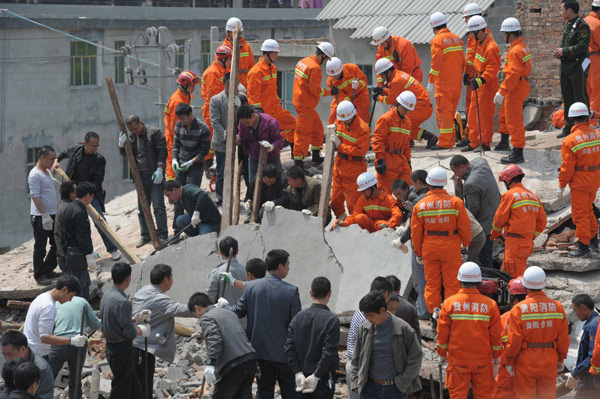Society
- Details
- By David Cao
- Hits: 1157

Songhuajiang Photo Shot in 2007
The program to reduce pollution between 2011 and 2015 will include emission targets for rural areas, Li Ganjie, vice-minister of environmental protection, said on Monday.
The country's vast rural areas, included in the program for the first time, are becoming more polluted than cities, he said.
"Pollution from agricultural sources already contributes to more than half of the country's total emissions," said Li. "It is high time that we addressed these problems."
But Li did not specify the contribution of rural areas in meeting these targets.
- Details
- By David Cao
- Hits: 848
Nine people were confirmed dead and 13 others injured after a building under construction collapsed Monday in Southwest China's Guizhou province, a safety official said Tuesday.

Rescue teams try to move a piece of concrete blocking the search for survivors after a building under construction collapsed in Yangguan village, Jinyang new district in Southwest China's Guizhou province, March 28, 2011.
- Details
- By David Cao
- Hits: 683
Developed-world proponents of the “China Model” often point to environmental degradation as an example of the intractable sort of problem authoritarian governments, free of the need for grinding public debate, are good at addressing. But in new study examining one of the country’s highest profile environmental problems, a team of Chinese and U.S.-based economists casts some doubt on that thesis.
The subject of the the study, published by the National Bureau of Economic Research, is Beijing’s air quality, which changed markedly before and after the 2008 Olympics.
Beijing spent more than $10 billion to clean up its sometime spooky brown polluted air before the Olympics. According to the study, the government managed to improve air quality by 30% during the games, compared to year-earlier readings. But a year after the games, about 60% of those gains had evaporated.
What’s one to make of this? Like many others, the authors of the NBER study — Yuyu Chen and Guang Shi of Peking University, Ginger Zhe Jin of the University of Maryland and Naresh Kumar of the University of Iowa – give credit for the impressive improvement in air quality during the Olympics to China’s authoritarian system. Countries with such governments can make huge efforts to clear away problems when they are motivated to do so, they say.
Read more: Weighing the China Model? Take a Deep Breath in Beijing
- Details
- By David Cao
- Hits: 875

China's Rural Migrants claims their salary by stopping their boss driving away.
China's massive population of rural migrants has been excluded from receiving the full benefits -- from health care to education -- of China's rapid urbanization drive, despite their remarkable contribution to this drive, a senior agricultural official said.
Chen Xiwen, vice director of the Leading Group on Rural Work of the Communist Party of China (CPC) Central Committee, told a development forum in Shanghai that although an army of people has moved from the countryside to work and live in cities in recent years, they are not treated as city dwellers.
Nearly half of China's population -- 630 million -- lived in urban areas in 2010, according to official statistics. The number of urban residents has grown by approximately 37 percent over the past ten years.
Experts said the calculation includes 285 million rural migrants who do not have an urban "hukou", or household registration. They have little access to education, social welfare and other rights and benefits that come with the registration.
Read more: China's Rural Migrants excluded from Urbanization Benefits
- Details
- By David Cao
- Hits: 957

At least 20 percent of domestic companies will be kicked out of the dairy market at the end of this month following the latest inspection by the central government of China's fresh milk and infant formula producers, official sources revealed.
To help Chinese companies win back a bigger share of the domestic market, the General Administration of Quality Supervision, Inspection and Quarantine (AQSIQ) ordered its local branches to re-inspect dairy enterprises that had already obtained production licenses. The deadline to do so is March 31.
According to data released in late February by four provinces and an autonmous region that had completed the re-inspection - Fujian, Guangdong, Shaanxi, Sichuan and Ningxia - all but Sichuan saw 30 percent of its dairy companies fail. Those companies will have their licenses revoked by the government.
In Sichuan, less than 20 percent of dairy enterprises failed.
More Articles …
Page 106 of 255